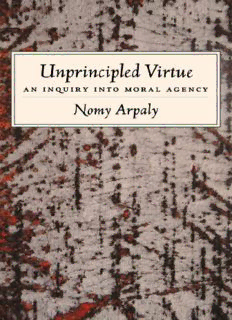
Unprincipled Virtue: An Inquiry Into Moral Agency PDF
Preview Unprincipled Virtue: An Inquiry Into Moral Agency
UNPRINCIPLED VIRTUE This page intentionally left blank UNPRINCIPLED VIRTUE AN INQUIRY INTO MORAL AGENCY Nomy Arpaly OXFORD UNIVERSITY PRESS 2O03 OXFORD UNIVERSITY PRESS Oxford New York Auckland Bangkok Buenos Aires Cape Town Chennai Dar es Salaam Delhi Hong Kong Istanbul Karachi Kolkata Kuala Lumpur Madrid Melbourne Mexico City Mumbai Nairobi Sao Paulo Shanghai Taipei Tokyo Toronto Copyright © 2003 by Oxford University Press, Inc. Published by Oxford University Press, Inc. 198 Madison Avenue, New York, New York 10016 www.oup.com Oxford is a registered trademark of Oxford University Press All rights reserved. No part of this publication may be reproduced, stored in a retrieval system, or transmitted, in any form or by any means, electronic, mechanical, photocopying, recording, or otherwise, without the prior permission of Oxford University Press. Library of Congress Cataloging-in-Publication Data Arpaly, Nomy. Unprincipled virtue : an inquiry into moral agency / Nomy Arpaly. p. cm. ISBN 0-19-515204-2 1. Ethics. 2. Psychology and philosophy. I. Title. BJ45 .A76 2002 170—dc21 2002025754 1 3 5 7 9 8 6 42 Printed in the United States of America on acid-free paper To my friends, who make life worthwhile This page intentionally left blank ACKNOWLEDGMENTS I would like to thank a number of people for their help with this work: Kimberlee Kane-Maguire, for igniting the first spark for this project, and for being such a wonderful friend and person. Timothy Schroeder, my one-in-a-million philosophical collaborator, friend, muse, coach, and editor, for endless support, long philosophical discussions, and the rest. George Sher, for philosophy, friendship, support, secretarial help, faith, hope, loyalty, and Pilsner Urquell, all invaluable. Russell Hardin, for in- creasing overall utility. My Stanford teachers, especially Michael Brat- man, Rachel Cohon, Ariela Lazar, Peter Godfrey-Smith, and Julius Moravcsik, and my unofficial mentors, David Copp, Stephen Darwall, Harry Frankfurt, Barbara Herman, Thomas Hill, Rosalind Hursthouse, Peter Railton, Thomas Scanlon, and David Velleman: their help, good will, and wisdom have been simply invaluable to me at various stages of developing these ideas, and I am forever in their debt. Andrew Conway, Maureen Kelly, Simon May, David Mills, Jonathan Schaffer, Erica Stephan, Asya Takken, Todd Takken, and Penny Tucker have all pro- vided invaluable emotional support. I am deeply indebted to my great colleagues at Rice University, one and all; to the people of the philoso- phy department at the University of Michigan, one and all; and to the faculty and the fellows at Harvard University's Center for Ethics and the Professions. Thanks also to the people who looked at drafts and provided very helpful comments, sometimes enduring the groans with which I viii ACKNOWLEDGMENTS greet astute criticism: Elizabeth Anderson, Arthur Applbaum, Sarah Buss, Ruth Chang, John Martin Fischer, Lori Gruen, Gilbert Harman, James Joyce, Angella Keckler, Shua Knobe, Janet Malek, Mary MacLeod, Alfred Mele, Rob Shaver, Heda Sedvic, Andrea Westlund, and various anonymous referees. I must also mention the following stu- dents, who kept me honest with fresh intuitions and uninhibited objec- tions: Maud Barriquand, D. J. Braisier, Grace Chu, Andrew Court- wright, Brad Lega, and Philip Mayor. Thanks are due to Louisa and Paulo Orizio of Dolce & Freddo, purveyors of splendid gelato and cof- fee, for allowing me to pace back and forth on the premises like some madwoman for hours on end while I was writing this book in my mind, and to Ann Pinchak, who can motivate very well. To all the people of whom fictionalized versions appear in my examples: I do hope you for- give me. I wish to thank Rice University, the University of Michigan, and the Center for Ethics and the Professions at Harvard University for support during the writing of this book. Thanks are also owed to various publish- ers for permission to reprint previous work. An earlier version of chapter 2 appeared in Ethics no (2000); some of the ideas presented in chapter 3 are due to appear in a shorter form in the Journal of Philosophy; a section of chapter 4 was presented at the Inland Northwest Philosophy Confer- ence in Spring 2001 and is due to appear in a volume edited by Joseph Keim Campbell, Michael O'Rourke, and David Shier for Seven Bridges Press; and some of the cases discussed in chapter 5 appeared in Philo- sophical Studies 93 (1998). CONTENTS 1 The Complexity of Moral Psychology 3 2 On Acting Rationally against One's Best Judgment 33 3 Moral Worth 67 4 Varieties of Autonomy 117 5 Blame, Autonomy, and Problem Cases 149 Notes 181 References 191 Index 197
Description: